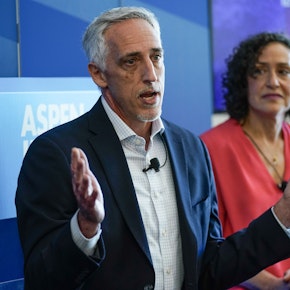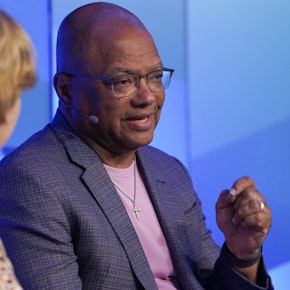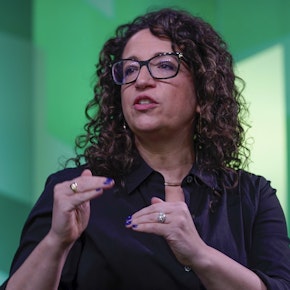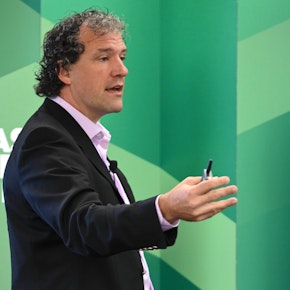Technology
Tech-Education

AI has the potential to create vibrant, inclusive communities as civil society organizations harness it to tackle inequality, industry leverages it to foster fairer practices, and commercial real estate uses it to create dynamic, accessible urban spaces.

Uncle Sam is rich enough that every young person in America can benefit from generational wealth transfer. Leaders from impact investing, philanthropy and the finance sector discuss market and policy innovations that could give every child capital to invest in the business of living.

The most fearless voice in tech journalism and author of the bestseller “Burn Book” shares her predictions about the future of the digital landscape — and the need to keep holding tech giants accountable. Book signing with Kara Swisher to follow.

Part 1. The Disruptors: Two of Silicon Valley’s most innovative founders also share a tight friendship. Airbnb CEO Brian Chesky has transformed how people travel, host and experience new worlds. Sam Altman’s OpenAI put artificial intelligence in the hands of everyone with the release of ChatGPT and set off a race to dominate the digital future. Part 2. Americ

One of the architects of artificial intelligence, now the CEO of Microsoft AI, shares what he sees ahead for AI — and for humanity — as we stand at this digital precipice.

AI’s evolution over the next two decades will redefine the white spaces of uncharted knowledge, revolutionize industries, alter societal dynamics and challenge ethical boundaries. How should we address questions about control, privacy and the very essence of human existence?

At a moment when decades of academic achievement have been lost, can we amplify the benefits of A.I. equally across society, or will we allow a deeper digital divide to leave out even more students? Khan Academy founder and CEO Sal Khan talks about the potential for this nascent technology to transform education, activating and engaging an entire generation to create chang...

Digital skills open doors to jobs in tech, media, and across all industries. Connecting diverse students and workers with the education and training needed for the 92% of today’s jobs that require digital skills creates a pipeline of talent, critical to driving economic opportunity and mobility.

Businesses of all sizes are struggling with skills gaps that threaten their growth, while millions of Americans are locked out of jobs by a paper ceiling. How do we build a skilled, fair workforce that meets the needs of employers and helps people reach their economic potential?

In this new Aspen Ideas format, all attendees gather each morning to kick off the day by exploring a current issue of deep complexity. The rapid growth of generative A.I. — surpassing expectations with over 100 million users of the technology in a short span of time — is a testament to its distinct intelligence and unique approach to problem-solving. There are many upsi...

While internet connectivity, technology, and digital skills are central to every part of modern life, the unfortunate reality is that millions of Americans have been left behind. We’ll discuss how transformational investment in digital equity and inclusion is helping close the digital divide.

David Rubenstein, co-founder and co-chairman of The Carlyle Group, one of the world’s largest private investment firms, discusses his perspectives on the investing world, and the insights recently gained from interviewing a number of the country’s best investors for his new book How To Invest—Masters of the Craft.

A large, unsettling question looming among Washington regulators, lawmakers, and now state Attorney’s General across the US is whether the time has come to break up the big five: Facebook, Amazon, Google, Netflix, Apple. Have these powerful tech companies, once the darlings of the start-up community not twenty years past, become so dominant that they are stifling competiti...

What is trust? “A firm belief in the reliability, truth, ability, or strength of someone or something.” (We googled it). How much, not to mention who, we should trust is more complex now, given the technological tools we have at our disposal and the crafty creatives who might push the world’s next great product, or the next fake story, or — far worse — the hackers who can...

Every day, young people connect with peers around the world in collaborative, technology-enabled learning experiences where they learn about and with each other. This session explores how facilitated technology can empower young people from different backgrounds to share their personal narratives and explore their differences for a deeper connection and understanding. The...

The Internet, to date, has been an open system that has enabled ideas to spread across borders, has created transformative new economies, and has helped people connect, create, and distribute information, exposing us to perspectives that were previously out-of-reach. But it’s also left behind those on the wrong side of the digital divide, and raised thorny new questions a...

Within our lifetimes, AI will, by design, begin to behave unpredictably, thinking and acting in ways which defy human logic. Big tech companies may be inadvertently building and enabling vast arrays of intelligent systems that don't share our motivations, desires, or hopes for the future of humanity. Is it too late to change course and realize a human-centered future for a...

What if technology could read and respond to emotions the way humans do? It turns out that it already can, and in this session you’ll see a mind-bending live demonstration of software that recognizes our feelings based on facial cues. We’ll also explore how everyday tech like text messaging can get in the way of important social connection, but also how applications like C...

Far too many students in the United States and around the world face challenges when seeking a quality education; this untapped potential is a waste of societal and economic resources. In this session, education and civil society leaders will talk about their efforts to engage underserved and refugee youth, and their successes and failures in helping those youth overcome b...

It is no secret that leaders, at home and abroad, have a problem with journalists. Rants against news organizations and individuals punctuate conversations in Europe and Asia as easily as they do in the United States. How do members of the media navigate their profession in such a climate? Some of the top journalists in the country, representing National Review, CNN, MSNBC...

